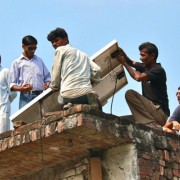 Modular design allows latrines to fit where they are needed most.
Sanergy
Modular design allows latrines to fit where they are needed most.
Sanergy
 Modular design allows latrines to fit where they are needed most.
Sanergy
Modular design allows latrines to fit where they are needed most.
Sanergy
Globally, 2.5 billion people lack access to basic sanitation. As a result, contact with human waste is a leading cause of diarrheal diseases, which is the second leading cause of child mortality in the developing world and claims the lives of nearly 760,000 children each year. Waste in slums, where toilets are not hooked up to sewage infrastructure, is often spilled or dumped into open waterways, risking thousands of lives. As a desperate measure, residents opt to use “flying toilets”—plastic bags as makeshift containers to collect and discard human waste.
In 2011, social enterprise Sanergy received a Stage 1 DIV grant from USAID to establish a working business model that fabricates low-cost hygienic latrines in Kenya’s slums and franchises them out to local entrepreneurs. The Sanergy team then collects the waste daily, brings it to a central processing facility, and converts it to organic fertilizer for use by commercial farmers. With this grant, Sanergy was able to sell, install and operate 60 sanitation facilities in Mukuru, Nairobi.
After demonstrating its initial success, Sanergy applied for and won Stage 2 DIV support from USAID to expand the franchise to service 70,000 slum residents through the sales of at least 700 toilets. The project leverages an in-house sales force and partnerships with community groups, NGOs and the Kenyan Government to sell toilets to local entrepreneurs to expand Sanergy’s sanitation infrastructure and waste processing operations.
Each Sanergy Fresh Life latrine provides sanitation to 77 people and costs only $350 to construct, compared to traditional community toilets that can cost up to $25,000 to build. A single Fresh Life toilet is also expected to generate between $800 and $1,000 per year in profit for the entrepreneur, many of whom operate several latrines or operate them adjacent to existing businesses. The Sanergy model nurtures the growth of a sustainable business ecosystem and offers a pathway to prosperity for local entrepreneurs while addressing sanitary conditions that affect 2.6 billion people.
Sanergy plans to expand its franchise model to operate over 1,500 Fresh Life toilets by 2015. Overall, the waste from the slums of Kenya creates a potential market of $178 million.














Comment
Make a general inquiry or suggest an improvement.